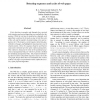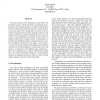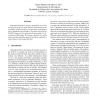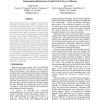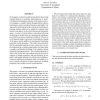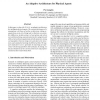WEBI
2005
Springer
15 years 8 months ago
2005
Springer
A novel web surfer model, where the transitions between web pages are fuzzy quantities, is proposed in this article. Such a model is appropriate when the links between pages are i...
WEBI
2005
Springer
15 years 8 months ago
2005
Springer
Cycle detection in graphs and digraphs has received wide attention and several algorithms are available for this purpose. While the web may be modeled as a digraph, such algorithm...
89
Voted
WEBI
2005
Springer
15 years 8 months ago
2005
Springer
This paper describes an approach for a composition of web services based on their semantic descriptions. The process section of OWL-S service descriptions is built with references...
121
click to vote
WEBI
2005
Springer
15 years 8 months ago
2005
Springer
The basis of much of the intelligence on the Web is the hyperlink structure which represents an organising principle based on the human facility to be able to discriminate between...
116
click to vote
WEBI
2005
Springer
15 years 8 months ago
2005
Springer
Automated methods for resource annotation are a clear necessity, as the success of the Semantic Web depends on the availability of Web resources with meta-data conforming to known...
128
click to vote
WEBI
2005
Springer
15 years 8 months ago
2005
Springer
We present a generic natural language processing (NLP) architecture, acronym QTIL, based on a system of cooperating multiple agents (Q/A, T, I, and L agents) which can be used in ...
108
click to vote
WEBI
2005
Springer
15 years 8 months ago
2005
Springer
The performance of an ontology alignment technique largely depends on the amount of information that can be leveraged for the alignment task. On the Semantic Web, end-users may ex...
106
click to vote
WEBI
2005
Springer
15 years 8 months ago
2005
Springer
One of the principal problems of online help is the mismatch between the specialized knowledge and technical vocabulary of experts who are providing the help, and the relative naÃ...
108
click to vote
WEBI
2005
Springer
15 years 8 months ago
2005
Springer
In this paper, we present an efï¬cient model for discovering repeated patterns in symbolic representations of music. Combinatorial redundancy inherent to the pattern discovery pa...
104
click to vote
WEBI
2005
Springer
15 years 8 months ago
2005
Springer
In this paper we describe ICARUS, an adaptive architecture for intelligent physical agents. We contrast the frameworkâs assumptions with those of earlier architectures, taking e...

